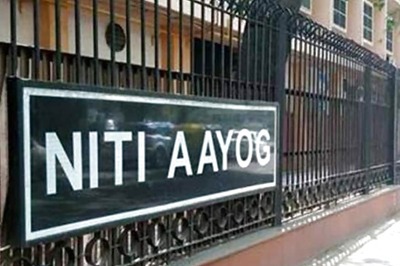
views
More than 20,000 anti-government protesters flooded the centre of Pakistan's capital on Saturday, vowing to stay in the streets until Prime Minister Nawaz Sharif resigns.
The numbers were far below what protest organizers expected, but the power of protesters to paralyse the central business district has presented the biggest challenge yet to the 15-month-old civilian government.
The unrest has raised questions about Pakistan's stability, at a time when the nuclear-armed nation of 180 million is waging an offensive against Pakistani Taliban militants and when the influence of anti-Western and sectarian groups is growing.
Riot police cordoned off two streets in downtown Islamabad with shipping containers and barbed wire for the protests. Protest organisers say they are peaceful but determined.
"We want Pakistan to be a peaceful state through our democratic revolution," populist cleric Tahir ul-Qadri told his followers in a short speech.
His supporters were adamant they would not leave until Qadri told them to. Most of the men carried stout sticks a few feet long. Brigades of men and women in fluorescent jackets had gas masks, swimming goggles and bottles of water.
"We are here to disarm the gas shells," explained one. Qadri, a cleric and political activist who usually lives in Canada, controls a network of schools and Islamic charities.
He wants the prime minister to resign and a new government of technocrats installed. He promises his supporters he will crack down on corruption, and generate enough funds to pay for homes, jobs, cheap energy and water.
"Once corruption is eradicated, the country can move forward. It is the only thing holding us back," said 15-year-old Umme Habiba, a vivacious student with dimples and long black robes who said she came with her whole family.
IMRAN KHAN
Former cricket star Imran Khan, who heads the opposition Pakistan Tehreek-e-Insaaf party, was also holding a smaller protest sit-in on an adjacent street.
The crowds - mostly young men - danced to music blasting from speakers or swapped T-shirts with Khan's face on them.
"Imran Khan is not a corrupt person. He's loyal to people and the country," said Aqsa Ijaz, a 25-year-old student sitting on top of a shipping container with her cousin, a banker.
Khan also wants Sharif to step down, accusing him of rigging last year's elections. Sharif won by a landslide, taking 190 out of 342 seats. Khan also did well in the elections, coming from political obscurity to take 34 seats, the third largest bloc in the legislature. But he says he should have had many more.
"I will not leave here until I have got real freedom for the country," Khan told thousands of supporters in the early hours of Saturday.
Like Qadri, Khan also commands intense personal loyalty from his followers. Pakistanis remember he led them to victory in the 1992 World Cup.
But on Friday a stone-throwing mob of ruling party loyalists attacked a convoy of Khan's supporters in the eastern city of Gujranwala. Khan was not injured, his spokeswoman said.
Some members of Sharif's party have suggested the protests are secretly backed by elements in the military, which has had an uneasy relationship with Sharif. To what extent Khan and Qadri can destabilise the government is likely to depend on the stance taken by the armed forces, which has a long history of mounting coups.
Few people fear a coup, but many officials think the threat of unrest will increase the military's hold over the government.
The military has been frustrated with the government, in particular over the prosecution of former army chief and president Pervez Musharraf for treason.
There has been disagreement, too, between the government and the army on how to handle the Taliban. The government insisted on peace talks but eventually the army launched an offensive.
The government is also struggling to overcome power shortages, high unemployment and spiralling crime.
"This government has failed the poor people," said farmer Razwan Baloch. "Everyone is here because life is so hard."

















Comments
0 comment